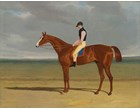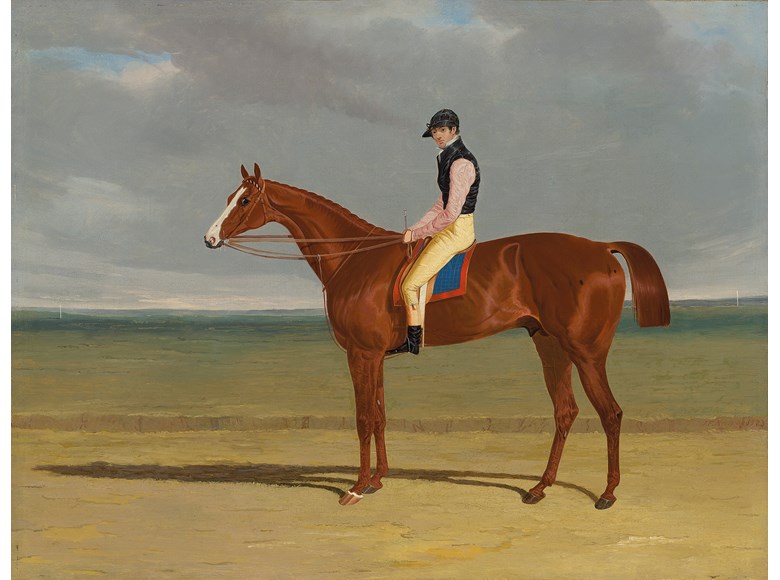 BACK TO GALLERY
BACK TO GALLERY
Rountree Tryon Galleries
John Frederick Herring Snr
The Hon. Edward Petre's chestnut colt 'The Colonel' with William Scott up, 1828
19 1/4 x 25 1/4 in. (48.9 x 64.1 cm)
description
John Frederick Herring Snr. (1795-1865)
The Hon. Edward Petre's chestnut colt 'The Colonel' with William Scott up, 1828
oil on canvas
signed and dated 'J.F. Herring 1828' (lower right)
19 1/4 x 25 1/4 in. (48.9 x 64.1 cm)
24½ x 30½ in. (62.2 x 77.5 cm) framed
Provenance:
collection of Sir Harold Parkinson, K.B.E., J.P.;
collection of Mr and Mrs Jack R. Dick, Connecticut;
Sotheby’s, London, 31 October 1973, lot 18;
Sotheby’s, London, 20 November, 1985, lot 138;
with Richard Green, 1993;
Private collection.
The Colonel (1825-1847) was a chestnut thoroughbred racehorse who was bred at the Wyvill Constable Burton stud in Yorkshire. He had a broad white blaze, stood at 15.2 hands high, and was owned by Edward Petre (1794-1848), a politician and prominent figure in racing. The Colonel is best known for running a dead heat in the Derby and winning the St Leger Stakes in 1828. In a racing career which lasted from 1827 until 1831, he ran fifteen times and won ten races at distances ranging from six furlongs to three miles. Other notable successes came in the Champagne Stakes, the Epsom Craven Stakes (twice), the Great Park Stakes at Ascot and the Northampton Gold Cup. He also placed in both the Ascot Gold Cup and Goodwood Cup.
At the end of the 1828 season, The Colonel was bought for £4,000 by King George IV, who is said to have decided to buy the horse after seeing a painting by John Frederick Herring Snr. After the death of the King in June 1830, The Colonel became the property of his brother, King William IV, and later stood at stud at Hampton Court. In Thomas Henry Taunton's Portraits of celebrated racehorses of the past and present centuries (1887) he is described as 'a small short horse, with very fine speed, high and fighting in his action', and 'the beau-ideal of an English thoroughbred'.
The Hon. Edward Petre's chestnut colt 'The Colonel' with William Scott up, 1828
oil on canvas
signed and dated 'J.F. Herring 1828' (lower right)
19 1/4 x 25 1/4 in. (48.9 x 64.1 cm)
24½ x 30½ in. (62.2 x 77.5 cm) framed
Provenance:
collection of Sir Harold Parkinson, K.B.E., J.P.;
collection of Mr and Mrs Jack R. Dick, Connecticut;
Sotheby’s, London, 31 October 1973, lot 18;
Sotheby’s, London, 20 November, 1985, lot 138;
with Richard Green, 1993;
Private collection.
The Colonel (1825-1847) was a chestnut thoroughbred racehorse who was bred at the Wyvill Constable Burton stud in Yorkshire. He had a broad white blaze, stood at 15.2 hands high, and was owned by Edward Petre (1794-1848), a politician and prominent figure in racing. The Colonel is best known for running a dead heat in the Derby and winning the St Leger Stakes in 1828. In a racing career which lasted from 1827 until 1831, he ran fifteen times and won ten races at distances ranging from six furlongs to three miles. Other notable successes came in the Champagne Stakes, the Epsom Craven Stakes (twice), the Great Park Stakes at Ascot and the Northampton Gold Cup. He also placed in both the Ascot Gold Cup and Goodwood Cup.
At the end of the 1828 season, The Colonel was bought for £4,000 by King George IV, who is said to have decided to buy the horse after seeing a painting by John Frederick Herring Snr. After the death of the King in June 1830, The Colonel became the property of his brother, King William IV, and later stood at stud at Hampton Court. In Thomas Henry Taunton's Portraits of celebrated racehorses of the past and present centuries (1887) he is described as 'a small short horse, with very fine speed, high and fighting in his action', and 'the beau-ideal of an English thoroughbred'.






 SEND AN EMAIL
SEND AN EMAIL
 +441798344207
+441798344207